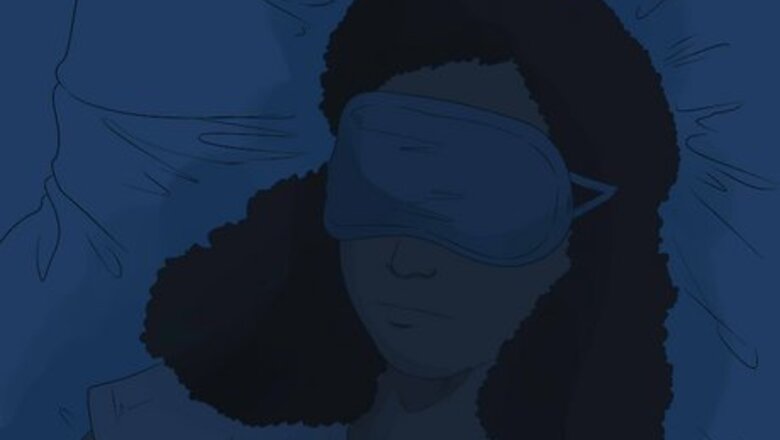
views
Keep your bedroom quiet and dark.
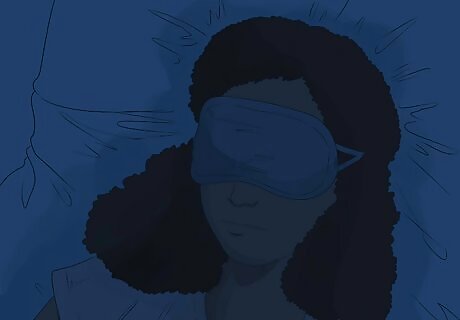
Your sleep environment is crucial to getting enough rest. Loud sounds and lights can make it harder to fall asleep, leaving you to toss and turn. When you go to bed, let as little light into your room as possible. On top of that, do your best to keep your bedroom quiet. So how can you achieve this? Try these tips: To limit light, cover your alarm clock and other light sources. Ask your parents to install blackout curtains or try a sleeping mask. Ask your family to keep it quiet while you’re trying to sleep. Or, try a noise machine, earplugs, and shutting your window.
Set your thermostat to a cool temperature.
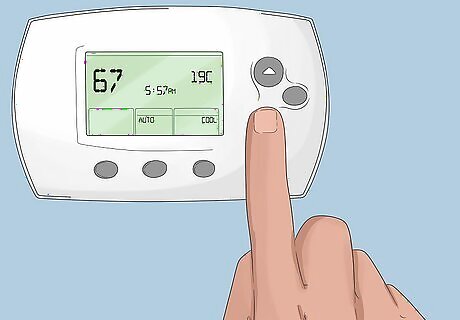
When temps are too hot or too cold, it distracts you from sleeping. Try to keep your room at a nice, comfortable temperature; specifically, go for 60-67 degrees F (15-19 C). Set your thermostat to this temperature if you can. Or, if you need to cool down a hot room, try a a fan or opening your window.
Do relaxing activities before bed.

Actively wind yourself down for bed to fall asleep more easily. Relax yourself before bedtime, and your body will be totally primed for sleep. People aren’t usually super thoughtful about what they do just before bed, but your pre-sleep activities can make a world of difference. Choose something relaxing and enjoyable to calm your body before bed. Stay positive. Take 30 minutes to write a log in your gratitude journal and think about something exciting you have coming up. Relax. Try stretching, meditating, or doing a breathing exercise. Warm up your body. Take a nice, warm shower in the last hour before bed. This can help you fall asleep more easily! Enjoy yourself. Listen to calming music, practice your instrument, or read a chapter of your book.
Stop using screens before bedtime.
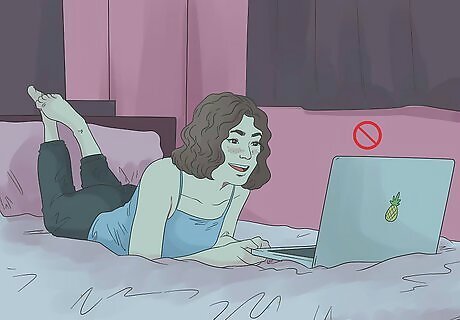
Your phone and laptop have blue light, which disrupts sleep. Did you know that blue light (which is in most tech lights) actually makes it harder to get melatonin? To get better sleep, limit your screen time, especially right before bed. For 1-2 hours before sleeping, stay away from TV, computers, and even your phone. Try something screen-less to keep you entertained. Read a book, plan your outfit for tomorrow, or shoot some hoops. Staying off your phone for 2 hours might sound impossible—if you feel like you can’t totally ignore it, limit the time you spend on your phone instead. Most phones have “blue light filters”—but their effectiveness isn't totally clear. Don’t assume that using your phone while it's filtered will solve your problem!
Eat a snack before bed.
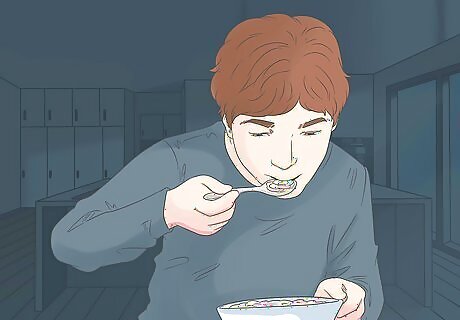
Teens have high metabolisms, which can leave their stomachs rumbling. Eating too much or too little before bed can disrupt your sleep, but for teens, eating too little is the more likely issue. Eat a snack with complex carbs, and you might be able to fall and stay asleep more easily. Try peanut butter on wheat bread, cereal, pretzels, or graham crackers.
Try aromatherapy.

If stress and worry is keeping you up, let essential oils help. Choose the right smells, and you can actually calm your brain and boost your mood right before bed. Depending on the oil you choose, they can also clear your airways (meaning you're less likely to wake up during the night). Either inhale using a diffuser or apply them directly to your skin. Lavendar, chamomile, clary sage, bergamot, sandalwood, and jasmine can all reduce stress and anxiety before bedtime. Peppermint and eucalyptus are known to clear your airways, making it easier to sleep the whole night through.
Follow a sleep schedule.
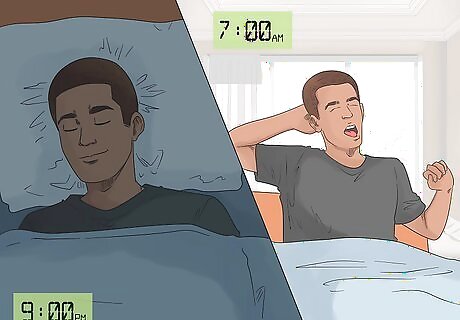
Your body thrives on routine—so staying consistent is key. Here’s a fun fact: waking up and going to bed at the same time each day actually promotes healthy sleep. Wild, right? To get better sleep, set alarms for the same time every morning and shoot for the same bedtime every night. It can be so tough not to snooze your alarm in the morning, but if you manage to wake up right away, your sleep schedule will benefit. Even on the weekends, stick to the same schedule. It’s all about circadian rhythms—and they don’t take breaks on Saturday and Sunday!
Limit afternoon naps.

Though they help you feel rested in the moment, late naps disturb sleep. You might be so sleepy when you get home from school, you can’t help but to crawl into bed for a nap. Do your best to fight the urge! Sleeping late in the afternoon can make it way harder to fall asleep at bedtime—and that’ll throw off your sleeping routine down the line, too. If you do take naps, make sure they’re no longer than 45 minutes. If you’re afraid you’ll oversleep, ask your family member to come and shake you awake at the right time. Only take naps before 4pm. This means that while you’re in school, naps should probably only happen on the weekend.
Exercise more.

When you tire your body out, you can prime it for sleep later on. Exercise has about a million amazing benefits, but a lot of teens don’t realize that healthier sleep is one of them. Do intense exercise for the best effects, but even a light walk or stretch session can make it easier to sleep, too. Don’t work out within 3 hours before bed. Exercise boosts energy, and if you do it too late in the day, it could hurt your sleep. Maybe you only have time to work out in the evening—if that’s the case, go with low-impact exercise (like doing yoga or taking a walk). If you want to do intense exercise, try swimming, start running, or do strength training.
Reduce your caffeine intake.
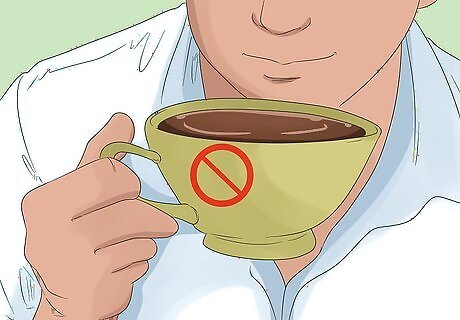
Coffee is a stimulant, so it makes sleeping more difficult. Now that you’re getting older, maybe you’ve started to enjoy a nice cup of joe in the morning. Coffee can feel great at first, but too late in the day can seriously effect your sleep. Follow these tips to help: Experts usually suggest that you stop drinking coffee before 2 p.m. Coffee even 6 hours before bedtime reduces sleep on average by a full hour! So depending on your bedtime, you might want to stop earlier in the day.
Work on relieving stress.

Worry, anxiety, and racing thoughts can keep you up at night. There are tons of ways to limit your stress—and if you’re able to do that, you’ll sleep better, too. Focus on doing stress-relieving activities, take some activities off of your plate, try to learn mindfulness, and reach out for support if you need help. Take time each week to enjoy your hobbies and passions—ask a friend to go hiking, play videogames, or do some writing. Say “no” to some of your responsibilities. To limit stress, take a break from one of your activities or sports. Mindfulness means you’re aware of your thoughts, and it can limit stress. Yoga, meditation, and journaling can help you improve this skill. If you’re struggling, open up to family and friends. Talking about how you’re feeling with someone you trust can help.
Expose yourself to natural light in the morning.

Natural light can help your body get back on track. It’s like magic—more light during the day (especially in the morning) means an easier time falling asleep in the evening. When you wake up, open your curtains immediately. Try to get as much sun as you can during the day, too. This will help your body get more melatonin, which can make great sleep way easier to achieve. Maximize your sunlight in the morning. Take your cereal out to the porch and eat your breakfast in the sun. Getting enough light while at school might feel tough. Focus on taking breaks (lunch, free periods, etc.) outside when you can. Talk to your parents about getting a light therapy box. In the winter months especially, this can help you get more natural light.
Pick up a calming game or activity when you can't sleep.
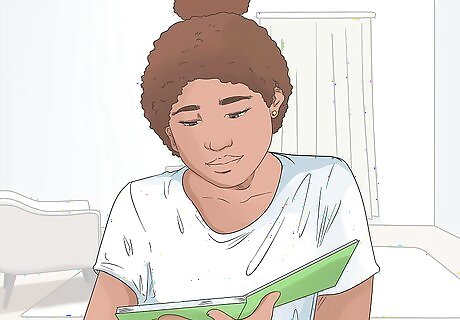
Healthy distractions make falling asleep feel less stressful. Tossing and turning and stressing out can feel so awful in the moment—if you’re lying in bed wide awake, change things up. Start doing a relaxing hobby or activity. This can help get your mind off the worries keeping you awake, and when you feel calm, you can try sleeping again. Do something a little boring, and you might even doze off doing it. Read a book that isn’t particularly exciting, for example! Do a simple activity, like knitting, coloring, or braiding your hair. Try a relaxing game, like solitaire or sudoku.
Aim to get 8-10 hours every night.
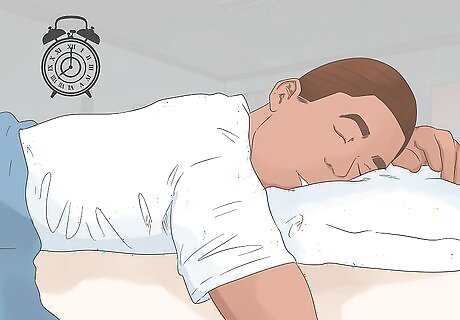
Teens need more sleep than adults. Getting sleep has tons of benefits for teens: brains develop faster, memory improves, and cognitive function does too, just to name a few. If your goal is to get more sleep, first you should find out how much you need for your age. So how much sleep should you get as a 13 or 14 year old? For anyone in their teen years (13-18 years old), shoot for 8-10 hours of sleep every 24 hours.
Talk to your doctor.

If you feel like you’ve tried everything, there might be a bigger issue. Sleep disorders and mental illnesses can make sleep especially difficult for teens. If you’re feeling hopeless and frustrated, ask your parents to take you in for professional help. A melatonin prescription, for example, can significantly improve the quality of your sleep. There might be a super easier treatment that can solve your issues ASAP, and all you needed was a doctor’s opinion!




















Comments
0 comment